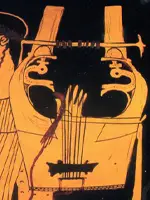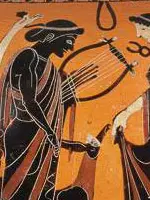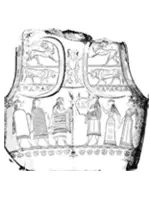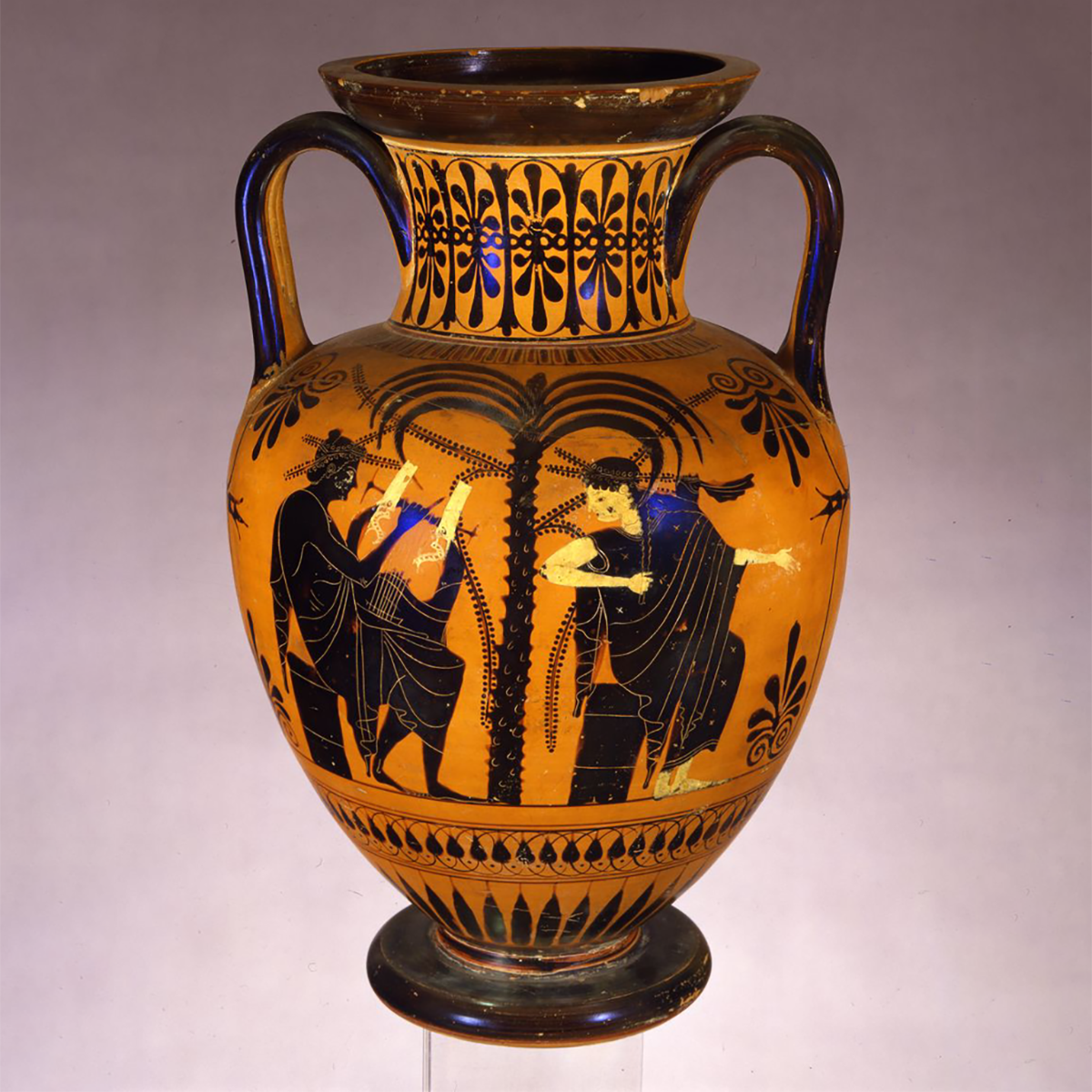Apollo
The God of Music
Son of Zeus and Leto, who gave birth to Apollo and his twin sister Artemis on the island of Delos, recognizable in iconography by the presence of the palm tree (tab 1). Apollo is the god of music, medical arts, science and prophecy. His attributes are the bow and a stringed musical instrument (which appear associated already in the Homeric Hymn to Apollo), specifically the kithara and the lyra given to him by Hermes: the construction of the latter instrument is extensively narrated in the Homeric Hymn to Hermes. Apollo is in fact depicted as a musician as early as the 7th century BC on the bronze cuirass from Olympia along with other deities. From the 6th century BC, on Attic black-figure pottery he is the musician who accompanies the various divine events (already in Iliad 1 the gods are cheered by Apollo’s music and the song of the Muses), alone or in the presence of other deities he is depicted in repetitive scenes in which the function of the god is blatantly intended to sublimate the contingent occasion through divine music.
The main scenes are the birth of Athena (tab 2), the procession accompanying Heracles to Olympus or other occasions of divine meetings (tab 3). At such junctures Apollo also uses the lyra, but more rarely (tab 4). Apollo is also depicted alone clad in chiton and himation or effigy with richly decorated robes, which renders the god assimilable to the professional kitharodos (tab 5). The figure of the latter spreads from the early fifth century BC onward, particularly on red-figure vase-painting, when Apollo is not infrequently depicted holding the kithara with his left hand and with his right hand holding out a phiale to perform a libation (tab 6).
Tab 1:
Apollo at Delos
Apollo is represented with the lyra or the kithara in Delos, often in the presence of his sister Artemis, sometimes with his mother Leto or other deities. The Cycladic island is indicated by the presence of the palm tree, on which Leto is said to have leaned to give birth to Zeus’ two sons (see for example the accounts of Callimachus in the Hymn to Delos and of Ovid in the Metamorphoses).
Tab 2:
Apollo as a kitharodos witnesses the birth of Athena
Apollo as a kithara-player presides with his music over the birth of the goddess Athena, daughter of Zeus and the goddess of prudence and wisdom Metis. Myth relates that Zeus had loved her, but it was fated that better children than her father would be born of their union: a very wise daughter and then a son with a violent heart. Thus, in the Theogony of Hesiod, Zeus, on the advice of Gaia and Uranus, deceitfully swallowed Metis, also appropriating her wisdom, but an oracle predicted to him that «the children born of Metis would be stronger than their father if conceived naturally». Through deception he then persuaded the goddess to turn into a fly and swallowed her. Sometimes, as recounted by pseudo Apollodorus, it is the goddess herself who advises Zeus in this regard. Metis, in any case, continued her gestation inside Zeus’s head until one day the god felt such a headache that it was unbearable, it seemed to him that his head was bursting, to such an extent that he asked the divine blacksmith Hephaestus to split his head with an axe. Suddenly out of his father’s head came Athena, already an adult, armed with shield, spear and warrior’s helmet: in a passage of Pindar, the newly born goddess is already ready to launch the war cry. The birth scene appears in a great many literary texts and also becomes the subject of the satire of Lucian of Samosata, who in the Dialogues of the Gods imagines the dialogue between Zeus and Hephaestus on this occasion. Other traditions tell that it was not Hephaestus but Prometheus who acted as ‘midwife’: so it is for example in Euripides’ Ion, where the chorus invokes Athena as a goddess born of Zeus’ head without the pains of childbirth.
Tab 3:
Apollo plays the kithara in divine processions
Apollo plays the kithara in the procession leading Heracles to Olympus, where the musician god usually advances in the background of the chariot. He appears in the same position when he participates in wedding processions or at a chariot on which a male or female deity stands or is in the act of climbing. Evidently, divine music was indispensable in the processions of the Olympian gods. Already in the Iliad, Hera accuses Apollo, who wants Hector’s body returned and condemns Achilles’ behaviour, of being present and playing at the wedding of Thetis and Peleus.
Tab 4:
Apollo with the lyre
On the same occasions in which Apollo is represented with the kithara, he may have the lyra that Hermes gave him. In fact, we read in the Homeric Hymn to Hermes (vv. 478-482) that the messenger god offered Apollo the instrument he had just invented, inviting him to take it with him on various festive occasions. On 6th century BC Attic black-figure vase-painting, Apollo is depicted predominantly while playing the kithara and more rarely the lyra. From 490-480 BC, on red-figure pottery, the god continues to have the kithara, which remains his main attribute on a par with the bow, but is no longer depicted in the act of playing it. In the same circumstances Apollo is depicted with the lyra, which can instead be played by the god.
Tab 5:
The professional kitharodos
Sometimes Apollo is depicted alone, clad in a chiton and himation, crowned by a taenia, or portrayed in richly decorated robes, which makes the god comparable to the professional kitharodos and confusable with the latter. The latter is sometimes depicted on the podium (βῆμα) where he performed, often in front of competition judges. The presence of the winged victory (Νίκη) recalls the musician’s success. On the fortune of singing performances accompanied by the kithara (κιθαρῳδία) in the context of public competitions between the 5th and 4th centuries BC, see a passage from Plato’s Laws.
Tab 6:
Apollo with the kithara/lyra and the phiale in the act of performing a libation
The figure of the professional kithara-player became more widespread from the beginning of the 5th century BC, particularly on Attic red-figure pottery, when Apollo is no longer depicted in the act of playing the great kithara, but rather while holding it with his left hand and with his right holding a phiale, a ritual vessel used for libations. Apollo is now depicted performing the ritual alone or, more often, in the presence of his mother Leto and Artemis. Sometimes, in the same circumstance the musician god has the lyra instead of the kithara.
Insights

kithara
The kithara is Apollo’s instrument, which he plays on numerous divine occasions and is his attribute on a par with the bow. However, it is also an instrument of the Dionysian world: both satyrs and maenads are depicted playing the kithara. Beginning in the early fifth century BC, it becomes the principal instrument of the professional kithara player who participates in musical agons.

lyra
According to the myth, the lyra was created by Hermes who used the shell of a tortoise as a sounding board to which he attached seven strings of sheep gut. Hermes gave the instrument to Apollo to make up for stealing a herd of the god’s oxen.

Olympia, Archaeological Museum
Late 7th cent. BC: bronze breastplate with Apollo as a citharode in the presence of Zeus and other deities.
Homeric Hymn to Apollo 131-132 (transl. M. L. West):
«I want the kithara (εἴη μοι κίθαρίς τε φίλη) and the crooked bow as my things. And I shall prophecy Zeus’ unerring will to humankind».
Homeric Hymn to Hermes 47-53 (transl. M. L. West):
«Cutting reed stalks to measure, he [Hermes] fixed them in, piercing the back of the stony-hided tortoise. Over them he cleverly stretched oxhide; he attached two arms, and fastened a crossbar on them, and stretched out seven sheep-gut strings to sound in concord. When he had made it, he carried the lovely plaything and tried it out with a plectrum in a tuned scale […]».
Iliad 1, 601-604 (transl. A. T. Murray, rev. W. F. Wyatt):
«Thus the whole day long till sunset they feasted, nor did their hearts lack anything of the equal banquet, nor of the beauteous phorminx (φόρμιγγος περικαλλέος) that Apollo held, nor of the Muses that sang, replying one to the other with sweet voices».
Callimachus, Hymn to Delos 209-211 (transl. D. L. Clayman):
«She loosened her belt and leaned back her shoulders against the trunk of a palm tree, distressed by grievous helplessness».
Ovid, Metamorphoses 6, 335-336 (transl. F. J. Miller, rev. G. P. Goold):
«There, reclining on the palm and Pallas’ tree, in spite of their stepmother, she brought forth her twin babes».
Hesiod, Theogony 886-900 (transl. G. W. Most):
«Zeus, king of the gods, took as his first wife Metis (Wisdom), she who of the gods and mortal human beings knows the most. But when she was about to give birth to the goddess, bright-eyed Athena, he deceived her mind by craft and with guileful words he put her into his belly, by the counsels of Earth and of starry Sky: for this was how they had prophesied to him, lest some other one of the eternally living gods hold the kingly honor instead of Zeus. For it was destined that exceedingly wise children would come to be from her: first she would give birth to a maiden, bright-eyed Tritogeneia, possessing strength equal to her father’s and wise counsel, and then to a son, a king of gods and of men, possessing a very violent heart. But before that could happen Zeus put her into his belly, so that the goddess would advise him about good and evil».
Pseudo Apollodorus, The Library 1, 20 (1, 3, 6) (transl. J. G. Frazer):
«Zeus had intercourse with Metis, who turned into many shapes in order to avoid his embraces. When she was with child, Zeus, taking time by the forelock, swallowed her, because Earth said that, after giving birth to the maiden who was then in her womb, Metis would bear a son who should be the lord of heaven. From fear of that Zeus swallowed her. And when the time came for the birth to take place, Prometheus or, as others say, Hephaestus, smote the head of Zeus with an axe, and Athena, fully armed, leaped up from the top of his head at the river Triton».
Pindar, Olympian Ode 7, 35-39 (transl. W. H. Race):
«[…] when, by the skills of Hephaestus
with the stroke of a bronze-forged axe,
Athena sprang forth on the top of her father’s head
and shouted a prodigious battle cry
and Heaven shuddered at her, and mother Earth».
Lucian, Dialogues of the Gods 13 (transl. M. D. Macleod):
Hephaestus: «What do you want me to do, Zeus? Here I am, as you ordered, all ready with my axe at its sharpest, even if I must chop through stones with a single blow».
Zeus: «That’s grand, Hephaestus. Now, down with it on my head and cut it in two […]».
Hephaestus: «All right, here goes. How can I help it, when it’s your orders? Hullo, what’s this? A girl in armour? That was no small trouble you had in your head. No wonder you were short-tempered, breeding a big girl like that in your brain—and her with armour into the bargain. It wasn’t a head you had but a barracks, though we didn’t know it. She’s leaping up and down in a war-dance, shaking her shield and poising her spear, full of the spirit of battle; and, most wonderful of all, see how good-looking and grown-up she’s become in this short time; she’s got grey eyes, but they go very well with her helmet. So, Zeus, pay me for my services as midwife, by betrothing her to me this minute».
Euripides, Ion 454-457 (transl. D. Kovacs):
(Chorus)
«I entreat you, Athena, my goddess,
you who never had part
in the pangs of childbed,
brought to birth from the forehead
of Zeus by Prometheus the Titan:
come, blessed goddess of victory,
come to the Pythian temple […]».
Iliad 24, 62-64 (transl. A. T. Murray, rev. W. F. Wyatt):
«And all of you, you gods, came to her marriage, and among them you yourself too sat at the feast, your phorminx in your hand (ἔχων φόρμιγγα), you comrade of evildoers, ever faithless».
Homeric Hymn to Hermes 478-482 (transl. M. L. West):
«Be a fine musician, fondling this clear-voiced
girl friend who knows how to talk fine and fittingly. Take her
confidently to the banquet and the lovely dance and the
bumptious revel, a source of good cheer day and night».
Plato, Laws 6, 764e (transl. R. G. Bury):
«[…] but in the case of music it will be proper to have separate umpires for solos and for mimetic performances,—I mean, for instance, one set chosen for rhapsodists, kithara-players (κιθαρῳδῶν), aulos-players, and all such musicians, and another set for choral performers».
































